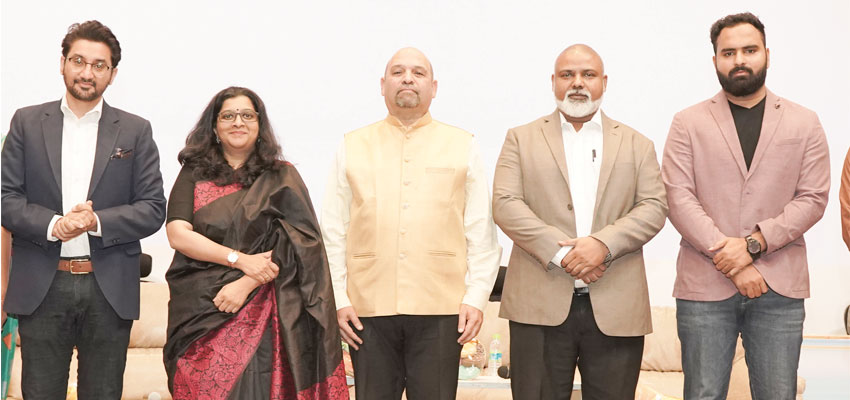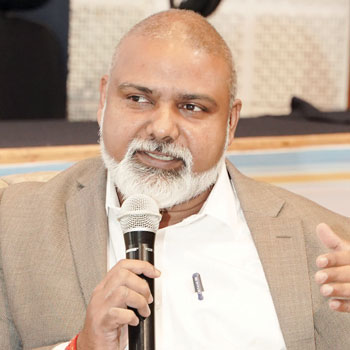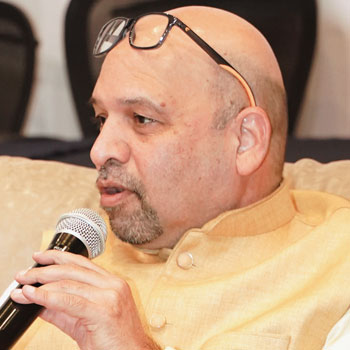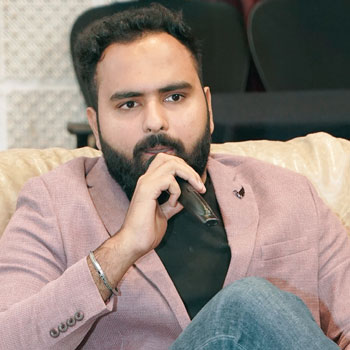Innovation, technology and future of business

"Startups have played a key role in India’s economic growth and helped the country to be third largest startup ecosystem in the world with over 1.75 lakh startups. To foster collaboration between emerging startups and industry leaders, a national level entrepreneurship competition 'Arambh' was held recently at Sri Balaji University, Pune (SBUP) campus wherein panellist discussed on the topic of ‘Entrepreneurship in 2025: Innovation, technology and future of business’. Corporate Citizen brings you excerpts from the engrossing discussion"
Rajkiran Pund: How is technology helping entrepreneurs and what are the challenges they are facing in terms of technology?
Kapel Malhotra: Technology is something that will keep on evolving. Today all of us are stuck to our mobile phones, from morning till we go to sleep in the night. An important question is how do we evolve ourselves beyond the technology? The human intelligence I honestly believe is way beyond any technology. So the question I have for all of you here is, how many of you actually spend some time meditating on a daily basis? What is very important is that technology will rule you if you cannot find a way to control yourself. There are different types of food, and when the cravings give-in, we get controlled by it. But, sometimes you decide - I am going to work out, go to the gym, go for a run, meditate, and choose to eat something healthy. We have the choices of technologies, but unless we upgrade our inner technology (human mind-body), we will always get overwhelmed and overruled by any technology that we confront. So, my message is that let us get our energy upgraded and evolved.
Q: Everything is changing fast in this era of entrepreneurship. What are the new opportunities and new challenges that we are facing?
Meetali More: While working in the society, we saw that few questions are unanswered. Startup is a very lucrative word and GenZs get attracted to the word startup. While founding a startup food business, we never knew that somebody is dying of hunger and we wanted to find out that. So, we roamed in the society, we worked pan India, found out the problems, because behind every idea there is a problem. In a country like India, we have lot of problems and challenges around—a lot of startup ideas come up around these problems. Generally, our livelihood or earnings is linked to our education, and the second thing is our social ecosystem. Around 20 per cent people of our society are deprived of both these ecosystems. Everybody is not lucky enough to get educated and get a good comfortable social ecosystem.
"Somebody has to think beyond placements. They have to pursue the startup dream because it is dear to them. They have to pursue the dream because they believe in it. They have to pursue the dream because they really want to make it happen. Do not pursue because it is quick money. There is no quick money in this world. Otherwise everyone would have become Ambanis and Adanis "
— Sapptarishi Ghosh
But they have to be equal contributors to the country’s ecosystem and I am very proud that we could cultivate the kind of comfortable ecosystem for these people who are never being tapped in India.
Q: The business landscape is changing. What are the new opportunities it is bringing for new entrepreneurs and what are the challenges?
Advait Kurlekar: If at all you want to start a new business or get into a business, or to be an entrepreneur, this is the right place and right time to be, because India is where everybody is looking at. I have been working in the startups space for last 15 years. Initially it was all brick and mortar, then it became click and mortar, and then it became only click. Everything now is tech. However, it is not true that unless you have the tech word, you cannot have a great startup. You have to be very cognisant of the advancement of technology but also be very clear that technology is for you and you are not for the technology. So, how do we use technology to make life easier and to give a better customer experience for our customers, clients, users and buyers, is important.
Panellists (L-R)

- Kapel Malhotra, founder and managing director, Total Solutions Group
- Dr. Meetali More, founder, GuruKey Educational Solutions
- Advait Kurlekar, CEO and founder, Upohan Management and Consultants Pvt. Ltd.
- Sapptarishi Ghosh, CEO, Symbiosis Centre of Entrepreneurship and Innovation
- Tushar Shetty, director, Ideas to Impacts Hub
- Prof. Rajkiran Pund, nodal officer, SrujanHub - Entrepreneurship Development and Incubation Foundation, SBUP (Moderator)
The second thing from a startup perspective is, the real opportunity for business is in tier-II, III and even IV cities. If you do a basic scan of data whatever limited is available, you will see that there is large amount of consumption money. Gone are the days when we were saying urban is rich and rural is poor. Slowly it is becoming other way around because cost of living in urban cities is becoming higher and salaries are stagnant, but rural income is growing and therefore there is lot of growth story in rural consumption. So again from an opportunity perspective, if you want to do a startup and especially if it is in B2C or D2C space then don’t look at the big cities at all, start your business and do a pilot in tier II and tier III kind of cities—you will get good traction. Time is good, traction is good.
Q: Though there is so much buzz around startup, still we don’t have much job creators, we have more job seekers. What’s your (Sapptarishi Ghosh) take on that?
Sapptarishi Ghosh: It is a very pertinent question, not very easy to answer—there is a bitter pill to be swallowed. I keep telling people that there has to be alignment in vision. The challenge we see today is because there is a dis-alignment in vision. What the central government perceives, what the university perceives and how the student perceive entrepreneurship, are three different tangents altogether. So till such time we are able to align it together, it is not going to function. So from the central government’s perspective, it’s more in terms of looking at the 3 trillion-dollar economy and how India is going to create employment and so on. So far as university is concerned it’s about grants, it’s about patents. Not many people really understand how entrepreneurship works. Many mentors focus on getting grants and patents. I don’t know many entrepreneurs who actually have grants and patents and made it big in life. Though this is important in certain businesses but not in all businesses.

So far as students are concerned, some of them and not all of them are very focused. But what I have found is that majority of students are having this culture of homogeneity— because somebody else is doing it they should also do it. What one needs to understand and appreciate is that they need to imbibe the quality of entrepreneur, and that is very important. Tech is important, desired thinking is important; understanding the ecosystem and connecting with investors is important. But, what is more important is to be resilient. So if you start looking at the world and start doing things, when you fall then there will be nobody next to you. One it’s a solo journey—it’s a journey in isolation. There are a lot of pit stops and potholes. Nobody talks about all of that unfortunately. There are a lot of failure stories. We as a society do not celebrate failures. We all experiment. So it's a very long, difficult tiring journey.
The student entrepreneurs who are here, my only request to them is that do not get into entrepreneurship for three reasons: because your friend is doing and it’s cool to do entrepreneurship, because you can amass wealth immediately, and because you can find a solution to anything and everything because you are smart. It’s a journey which is long, tiring, difficult and it has a lot of challenges. Take it, only if you are resilient, if you are willing to unlearn and relearn, if you are willing to take that risk. Somebody has to think beyond placements.
They have to pursue the dream because it is dear to them. They have to pursue the dream because they believe in it. They have to pursue the dream because they really want to make it happen. Do not pursue because it is quick money. There is no quick money in this world. Otherwise everyone would have become Ambanis and Adanis.
"Let your idea that you conceive become matured. A baby grows in the mother’s womb for nine months, until it is not matured it is not delivered. So stay with your idea for at least 21 days, daily add value to your idea, then only it will get matured to come on the table"
-Dr. Meetali More
Q: Students keep asking us one simple question, job or startup?
Kapel Malhotra: When you come to the point of being a startup or being an entrepreneur or being a jobseeker, I think, first of all you need to have the entrepreneurial spirit or the ownership mindset. There are certain traits that are there and if you are able to build those traits in yourself individually. Today when we look at India and at the time of the century we are in, I think the only thing you need to do is something extra from the ordinary and by default you will become extraordinary, because you are in the right place and right time. So have the ownership mindset, have entrepreneurial spirit in whatever you are doing, you will see the difference.

Q: In an era where everyone is craving for profits, everyone wants to build startups to get million-dollar funding, why did you (Meetali More) chose entrepreneurship as a career and then moved on towards social entrepreneurship?
Meetali More: I am also doing business like others do. I also own a startup like others do. But, I only pinpoint on the questions which are related to my society. I came from the academic background and had 13 years experience of teaching entrepreneurship development. I jotted down few questions which were the gap between what actually the government gives for the entrepreneurship and what we actually want. I started working on it as a project and started filling up the gaps. When the Indian government raised the budget of entrepreneurship fund from Rs 1,000 crores to 1,500 crores—the question was, why did they do so? They are looking at the capacity of Indian population having the average age of 28–29 years. So, we started working on the problems which were already there. Rather than taking up a new business idea and coming up with some new problems, we believe in addressing the old problems which are already there.
When people come to me before the idea pitch competition and ask me for an idea they should pitch for, I tell it is Sustainable Development Goals (SDG). I tell them to go and study all 17 sustainable development goals and they will get 15,000 ideas from them. This is how we enjoy our work, and of course when you work for the community satisfaction automatically occurs. So, we lead a good life, don’t work in a hustle, have a good sleep and have many happy faces.
Q: It is said this is the best time to start startups. What are the opportunities in the market? Why should one pursue entrepreneurship?
Advait Kurlekar: You should not pursue entrepreneurship because you didn’t get a job. When I say that this is the best time to start your own business then it also means that the opportunities are infinite. From a startup perspective what could be the sources for your entrepreneurial idea. More often than not I have seen it is from your personal experience.
For example, one of my mentee in Delhi has come out with a device called a hip guard. Essentially it is for older people. You wear that thing always—it is comfortable while sleeping and the moment you get up from bed, it puffs up. In case the elderly person wearing it falls down, the hip guard protects the wearer against any fracture. Where this idea came from? Unfortunately, for this mentee, it came from his own grandparents, whom he saw actually go through this problem. Around 78 per cent of the times when it occurs, it leads to mortality. That was the basis for the startup. So it can be from your personal experience.
"From an opportunity perspective, if you want to do a startup and especially if it is in B2C or D2C space then don’t look at the big cities at all, start your business and do a pilot in tier II and tier III kind of cities— you will get good traction. Time is good, traction is good"
— Advait Kurlekar
Don’t start your entrepreneurial journey with a solution but start with a problem because if you start with a solution you will be married to that solution. You should be married to the problem and not the solution. If you are married to the solution that I want to do this, then if there is some other solution that comes later, your mind is blinded and says “I am God’s gift to mankind therefore this is my best idea and therefore no idea is better”. But, if you are married to the problem and if there is some other alternate solution, then you have the mental latitude to say “Yes, maybe this is better than what my original thought process is.”
Therefore, the source of your startup has to be a problem statement. The problem has to be large enough, here and now. Very importantly the problem has to be costly. When I say costly, your solution may not be costly, the problem has to be costly. It means the problem is so large that not solving the problem is a costly affair. That’s where scalability and consumer behaviour will come up. So, personal experience can be one starting point but identification of large and costly problem can also be another option.
Q: You (Tushar Shetty) have actually worked with startups on ground and you have observed them rising and failing. Do you really think it's a good time to start a startup? Do you think we have that environment and ecosystem in place for it?

Tushar Shetty: An article I read recently, stated that in Bengaluru 12 lakh people are quitting their jobs and starting their startups now in the next year. This is a huge number. What we need today for startup is access to customers, funding and right kind of team. I think India solves all kind of these needs. We have now access to funds—we have 150 VC funds, have lot of angel funds, have government which is putting up lot of money. There are lot of schemes—there is Startup India Scheme which gives access of Rs 50 lakh rupees’ credit, grant, etc. You have many government schemes for early support. There are many angels that are backing you. Lot of retail investors have also started looking at startups as an investment opportunity, which was never the case earlier. What we are also seeing is that lot of startups have now started exiting their business, which means that money is coming back and now they are also investing in these companies back as part of ecosystem support. You would have seen that Sachin Bansal, Kunal Bahl and others reinvesting money in the startups, creating opportunities and that is the right kind of shift which is happening. Now this is the right time where you should look at starting your own company. Funding is not a problem if you are building a good product. Customer access is also not a problem as enterprises are coming to you. They are doing roadshows and hackathons for you.
"The only thing you need to do is something extra from the ordinary and by default you will become extraordinary, because you are in the right place and right time. So have the ownership mindset, have entrepreneurial spirit in whatever you are doing, you will see the difference "
-Kapel Malhotra
Q: AI has become a buzzword and everyone wants to go with the buzzword. Social media is there and new kind of consumerism is there. We can find our consumers and target market on social media itself. So how can this technology be used as a pushing factor and a helping hand for entrepreneurship?

Sapptarishi Ghosh: This is a very interesting question and this is where most of the people go wrong because they latch onto something which is a fad. We need to understand what problem we have to solve. Now most of the students and aspiring entrepreneurs who come to me, they say “I am interested in XYZ technology and I want to do certain things like this”. For a PhD holder the journey is between 3 to 5 years because there is a lot of research and gap identification one needs to do and while you do these gap identifications it is very critical to go to the grassroot level, spend time, identify and define the gap then you ideate. But, what happens today is that most people sit in air-conditioned rooms and have this eureka moments. They don’t bother to go back and validate what they have thought. They will speak to what we call convenient sampling who are supporters and not critics. They will think life is glorious. Because they know a particular technology, they start the journey. Now what we need to understand is that technology itself is evolving very fast.
What is very critical is not relying on the technology but relying on the problem statement, defining the gap, understanding and defining where the problem is and how do we solve it, then looking at a possible solution. Instead of fixing the solution and backward integrating to the problem, is not going to show any way to the success. The only way to success is to define the problem, then look around what is available at that point in time. Now identification itself might take two to three years. The problem is everybody wants to identify, fix and pitch in three-month time—that is not going to give results. There are lot of problems that do not need deeptech and AI.
Find a solution. Tech can be enablers— use tech to solve the problem. What kind of technology would depend on the kind of problem and the phase at which you solve the problem. You also need to be futuristic with an open mind to unlearn and relearn to redo things so that you can have a longer runway.
Q: We have lack of awareness of government schemes. We have technology advancement. How can we leverage all these factors to become an entrepreneur?
Tushar Shetty: We have access to all the resources to build a company. GenAI and LLMs that are coming up have a lot of use cases from drug test discovery to how you are increasing drug discovery timelines. Technology is changing rapidly and we cannot predict what will happen after six months. Startups are also evolving. As a startup founder you have to use technology as a tool. What new things you can do every six months with the technology is something that you have to figure out as an organisation. Things are changing rapidly. Companies are building space rockets, air travel drones or taxis etc. We do not know what will happen in next one year also. If startups can work on these technologies, figure out the baseline, put technology on top of it and then scale it, I think nobody can stop them.
If you want to do something, then do it in B2B space as it is much easier and you have one single customer who can pay you a good amount. You can build on that product and eventually have more customers. It’s not like a D2C brand where you will have to spend a lot of money in terms of marketing. Enterprise is much easier to sell and we do invest in lot of enterprise B2B companies only. It is our forte. That’s a much easier game. It is risk free game. There is also a high chance that you might get acquired by a company which is doing something similar or wants to enter that space.
Q: Technology is at our advantage and we can leverage it to start a business and grow with that business. But as an aspiring entrepreneur every person has this one thing in mind — where to start?
Kapel Malhotra: You will never find the right time, when to start. There are multiple things that you can put together to start. It’s a series of actions that will get you to that stage. You also need to have goal setting. You need to have the goal in front of you.
When I started my entrepreneurial journey there was nothing known as investors. There were only banks and some moneylenders. Now we have so many options. There is no good time and no bad time. The only thing is when you prepare yourself to take the plunge. I honestly feel this is the great time for whatever you want to do and go for it. There is nothing known as perfect time. Yes, if you continue on the path, you will learn so many things and that is one of the best things about entrepreneurship and whatever you do in life. There is no ceiling in terms of the ability to learn. It is limitless and that makes you a better person.
Tushar Shetty: You don’t start because you have to become a unicorn. You start because you like doing it. Then you will progress. It will open up vistas and will also close certain doors. You have to adapt to all those changing circumstances and navigate through.
"Things are changing rapidly. Companies are building space rockets, air travel drones or taxis etc. We do not know what will happen in next one year also. If startups can work on these technologies, figure out the baseline, put technology on top of it and then scale it, I think nobody can stop them"
-Tushar Shetty
Q: As this is the best time to start the entrepreneurial journey, whoever wants to start the entrepreneurial journey, they must dive into it, start experimenting and not be fearful. What is your suggestion to our entrepreneurs?

Meetali More: Let your idea that you conceive become matured. As the child grows in the mother’s womb for nine months, until the baby is not matured it is not delivered. So stay with your idea for at least 21 days, daily add value to your idea, then only it will get matured to come on the table.
Advait Kurlekar: There are two reasons why you want to do startup. Do you want to make money from business or of business? From the business means growing. Everybody says that it is my passion and therefore I have started the idea. You can’t say that after a year or two, I am going to exit the business, make money and move on. So that’s making money from the business. The other is of course I want to exit, find some bakra, move along and make money. That’s making money of the business. Nothing right or wrong. But, I would still say, if you are really passionate about entrepreneurship, really focus on building a business, money will happen.
Sapptarishi Ghosh: The reason that it is the best time to start is because a host of facilities are available at your disposal – incubators, venture capitalists, private equities, angel funds, mentors and everybody possibly who can help you. Other than that there is an entire ecosystem which is congenial. Today we are looking at entrepreneurs as celebrity entrepreneurs. There has never been a better time. So please start. Do your research, do project-based learning, understand and then deep dive.
Tushar Shetty: I believe that ideas are important but don’t marry your ideas because ideas are not the ones that will lead you to the end goal. What I have seen in most cases is that ideas might get diverted. What you are starting up with earlier might change to something else completely. You should not marry with the idea. You should think about what’s new in the market. It is important for an entrepreneur to do business.